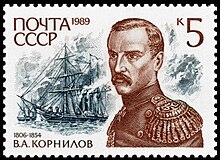Vladimir Alexeyevich Kornilov
| Vladimir Alexeyevich Kornilov | |
|---|---|

Soviet stamp depicting Kornilov
|
|
| Born |
13 February 1806 Ryasnya, Tver Governorate, Russian Empire |
| Died | 17 October 1854 (aged 48) Sevastopol, Russian Empire |
| Buried at | St. Vladimir's Cathedral, Sevastopol |
| Allegiance |
|
| Service/branch |
|
| Years of service | 1821–1854 |
| Rank | Admiral |
| Battles/wars | |
| Awards |
Order of St. George Order of St. Vladimir Order of St. Anna |
Vice Admiral Vladimir Alexeyevich Kornilov (Влади́мир Алексе́евич Корни́лов; 13 February 1806 – 17 October 1854) was a Russian naval officer who took part in the Crimean War.
Kornilov was born on his family estate in Staritsky District, Tver Governorate in 1806. His father was governor of Irkutsk. Kornilov entered the naval service in 1823, and in 1827 he fought in the Battle of Navarino as a midshipman aboard the fleet's flagship Azov.
In 1841 he became the first captain of the battleship Twelve Apostles, he disciplined the crew and participated with it in the Black Sea Fleet Review (held every seven years) before Grand Duke Konstantin Nikolayevich. He sailed to London in 1847 to buy a new steam frigate. In 1849 he became chief of staff Black Sea Fleet.
In 1853, with his flag hoisted aboard the 11-gun steam frigate Vladimir (commanded by Lieutenant-Commander Grigory I. Butakov) met a 19-gun Turkish Vessel, the Pervaz-ı Bahrî, when they were cruising close to Penderakli. Kornilov gave the order of engaging the enemy and the Vladimir joined battle against Pervaz-Bahri. The Ottoman ship had no bow and stern artillery, so every time it employed its side artillery, Butakov manoeuvred to rake its stern. Considering that the battle was taking too long, Kornilov gave the order to speed the sinking of the enemy. Cpt. Butakov ordered to speed up the ship and approaching the enemy to around 100 meters, fired canister rounds from all his side guns. The Pervaz-Bahri had suffered heavy casualties in the 3 hour long battle and hauled its flag. The ship was transported to Sevastopol where it was commissioned to the Russian Navy as Kornilov.
...
Wikipedia
